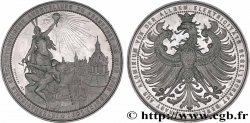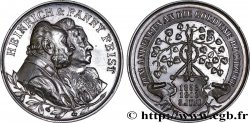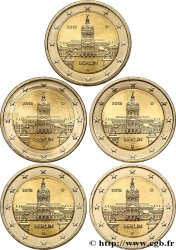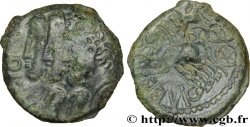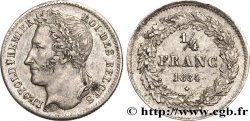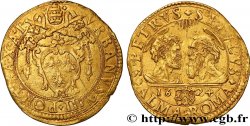No disponible.
Artículo vendido en nuestra tienda (2017)
Precio : 250.00 €
Artículo vendido en nuestra tienda (2017)
Precio : 250.00 €
Tipo : Médaille maçonnique de Ferdinand, duc de Brunswick-Lunebourg
Fecha: 1782
Nombre del taller / ciudad: Prusse
Metal: estaño
Diámetro: 40 mm
Eje de acuñación: 12 h.
Peso: 24 g.
Canto: lisse
Comentarios sobre el estado de conservación:
Médaille fendue sur la tranche, sonnant creux. Nettoyée anciennement
Anverso
Titulatura del anverso: FERDINAND : D: BRVNSV: &: LVNEB: M: MAG: ORD: / ELECT: DIE 17 AVG 1782.
Descripción del anverso: Buste à droite.
Reverso
Titulatura del reverso: POST TENE - BRAS LVX. // IN CONVENT GENREALI / WILHELMSBAD.
Descripción del reverso: Nom de Jéhovah en hébreux dans un triangle rayonnant.
Comentario
Médaille signée L. AOCKM pour le médailleur Johann Leonhard Stockmar (1755-1852).
Ferdinand (12 janvier 1721, Brunswick – 3 juillet 1792), duc de Brunswick-Lunebourg, général prussien, fils de Ferdinand Albert II de Brunswick-Wolfenbüttel, duc de Brunswick-Bevern, Brunswick-Lüneburg et Brunswick-Wolfenbüttel et d'Antoinette de Brunswick-Wolfenbüttel.
Il servit d'abord sous Frédéric le Grand, roi de Prusse, puis commanda pour George II les troupes britanniques et hanovriennes dans la guerre de Sept Ans, 1757, s'empara de Minden et chassa les Français de la Hesse-Cassel (1762). Il quitta le service à la paix (1763), et se consacre le reste de sa vie à la franc-maçonnerie, il est Grand maître au sein de la Stricte observance templière) et à des pratiques théosophiques.
Il est également maître maçon au sein des Frères asiatiques et membre des Illuminés de Bavière sous le nom de Aaron, affilié en 1783.
Le savoisien Joseph de Maistre publie en 1782 le Mémoire au duc de Brunswick à l'occasion du convent maçonnique de Wilhelmsbad que doit présider le duc Ferdinand de Brunswick-Lunebourg.
Post tenebras lux est une phrase latine signifiant « Après les ténèbres, la lumière » et parfois traduit en « La lumière après les ténèbres ». Il s'agit d'une version raccourcie de la phrase « Post tenebras spero lucem » (« Après les ténèbres, j'espère la lumière ») provenant de la Vulgate du Livre de Job.
La phrase est adoptée comme devise calviniste et se trouve par la suite choisie comme devise de toute la Réforme protestante et de la ville d'adoption de Jean Calvin : Genève..
Medal signed L. AOCKM for the medalist Johann Leonhard Stockmar (1755-1852).
Ferdinand (January 12, 1721, Brunswick – July 3, 1792), Duke of Brunswick-Lüneburg, Prussian general, son of Ferdinand Albert II of Brunswick-Wolfenbüttel, Duke of Brunswick-Bevern, Brunswick-Lüneburg and Brunswick-Wolfenbüttel and Antoinette of Brunswick-Wolfenbüttel.
He first served under Frederick the Great, King of Prussia, and then commanded the British and Hanoverian troops for George II in the Seven Years' War, 1757, captured Minden and drove the French from Hesse-Kassel (1762).. He left the peace service (1763), and devoted the rest of his life to Freemasonry, he was Grand Master within the Strict Templar Observance) and to theosophical practices..
He was also a master mason in the Asian Brotherhood and a member of the Bavarian Illuminati under the name of Aaron, affiliated in 1783..
In 1782, the Savoyard Joseph de Maistre published the Memoir to the Duke of Brunswick on the occasion of the Masonic convent of Wilhelmsbad, which was to be presided over by Duke Ferdinand of Brunswick-Lüneburg..
Post tenebras lux is a Latin phrase meaning \\\"After darkness, light\\\" and sometimes translated as \\\"Light after darkness\\\". This is a shortened version of the phrase \\\"Post tenebras spero lucem\\\" (\\\"After darkness, I hope for light\\\") from the Vulgate Book of Job.
The phrase was adopted as a Calvinist motto and was subsequently chosen as the motto of the entire Protestant Reformation and of John Calvin's adopted city: Geneva..
Ferdinand (12 janvier 1721, Brunswick – 3 juillet 1792), duc de Brunswick-Lunebourg, général prussien, fils de Ferdinand Albert II de Brunswick-Wolfenbüttel, duc de Brunswick-Bevern, Brunswick-Lüneburg et Brunswick-Wolfenbüttel et d'Antoinette de Brunswick-Wolfenbüttel.
Il servit d'abord sous Frédéric le Grand, roi de Prusse, puis commanda pour George II les troupes britanniques et hanovriennes dans la guerre de Sept Ans, 1757, s'empara de Minden et chassa les Français de la Hesse-Cassel (1762). Il quitta le service à la paix (1763), et se consacre le reste de sa vie à la franc-maçonnerie, il est Grand maître au sein de la Stricte observance templière) et à des pratiques théosophiques.
Il est également maître maçon au sein des Frères asiatiques et membre des Illuminés de Bavière sous le nom de Aaron, affilié en 1783.
Le savoisien Joseph de Maistre publie en 1782 le Mémoire au duc de Brunswick à l'occasion du convent maçonnique de Wilhelmsbad que doit présider le duc Ferdinand de Brunswick-Lunebourg.
Post tenebras lux est une phrase latine signifiant « Après les ténèbres, la lumière » et parfois traduit en « La lumière après les ténèbres ». Il s'agit d'une version raccourcie de la phrase « Post tenebras spero lucem » (« Après les ténèbres, j'espère la lumière ») provenant de la Vulgate du Livre de Job.
La phrase est adoptée comme devise calviniste et se trouve par la suite choisie comme devise de toute la Réforme protestante et de la ville d'adoption de Jean Calvin : Genève..
Medal signed L. AOCKM for the medalist Johann Leonhard Stockmar (1755-1852).
Ferdinand (January 12, 1721, Brunswick – July 3, 1792), Duke of Brunswick-Lüneburg, Prussian general, son of Ferdinand Albert II of Brunswick-Wolfenbüttel, Duke of Brunswick-Bevern, Brunswick-Lüneburg and Brunswick-Wolfenbüttel and Antoinette of Brunswick-Wolfenbüttel.
He first served under Frederick the Great, King of Prussia, and then commanded the British and Hanoverian troops for George II in the Seven Years' War, 1757, captured Minden and drove the French from Hesse-Kassel (1762).. He left the peace service (1763), and devoted the rest of his life to Freemasonry, he was Grand Master within the Strict Templar Observance) and to theosophical practices..
He was also a master mason in the Asian Brotherhood and a member of the Bavarian Illuminati under the name of Aaron, affiliated in 1783..
In 1782, the Savoyard Joseph de Maistre published the Memoir to the Duke of Brunswick on the occasion of the Masonic convent of Wilhelmsbad, which was to be presided over by Duke Ferdinand of Brunswick-Lüneburg..
Post tenebras lux is a Latin phrase meaning \\\"After darkness, light\\\" and sometimes translated as \\\"Light after darkness\\\". This is a shortened version of the phrase \\\"Post tenebras spero lucem\\\" (\\\"After darkness, I hope for light\\\") from the Vulgate Book of Job.
The phrase was adopted as a Calvinist motto and was subsequently chosen as the motto of the entire Protestant Reformation and of John Calvin's adopted city: Geneva..








 Informar de un error
Informar de un error Imprimir la página
Imprimir la página Comparte mi selección
Comparte mi selección Haz una pregunta
Haz una pregunta Consignar / vender
Consignar / vender
 Descriptivo
Descriptivo